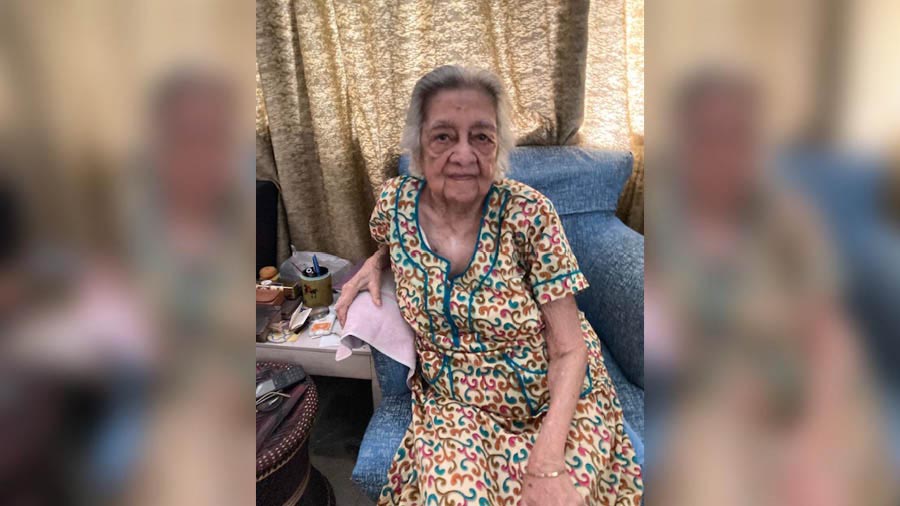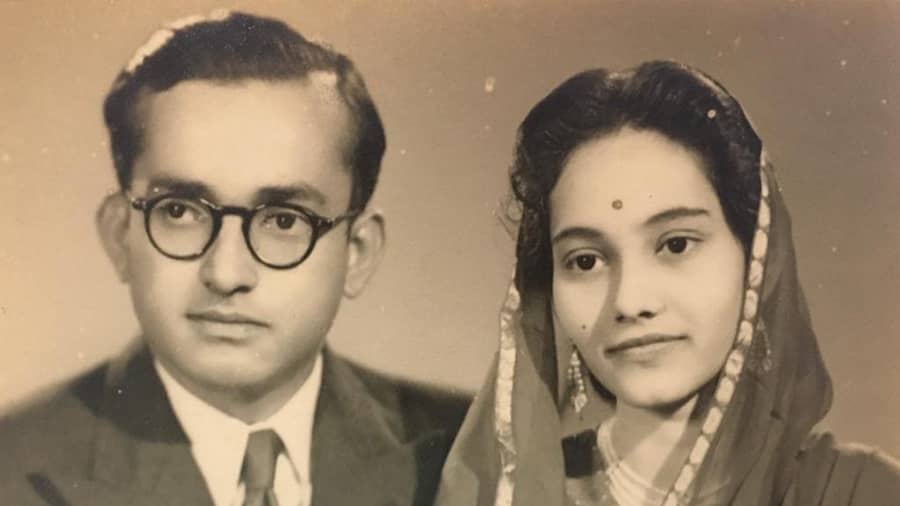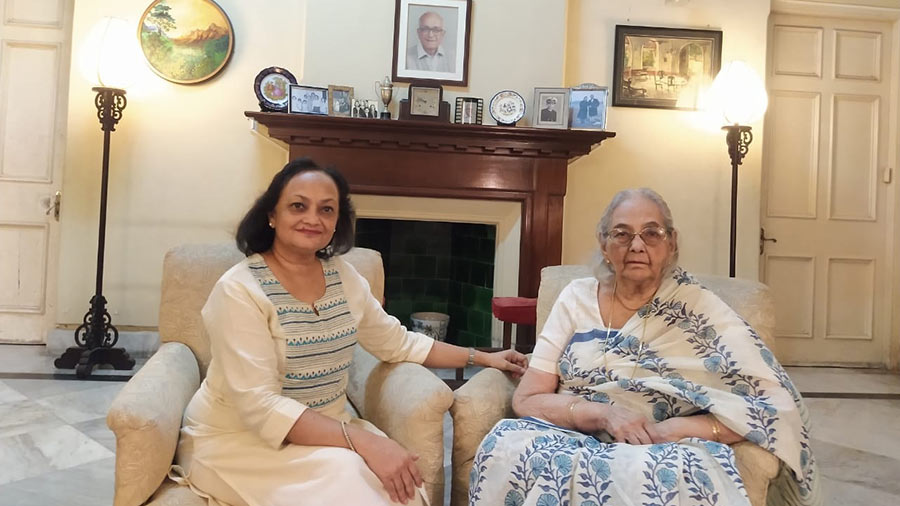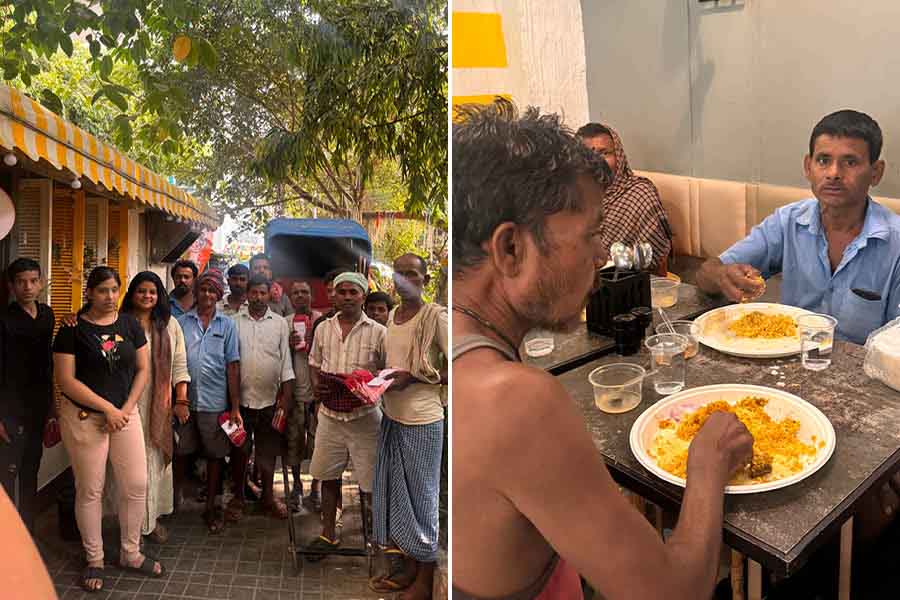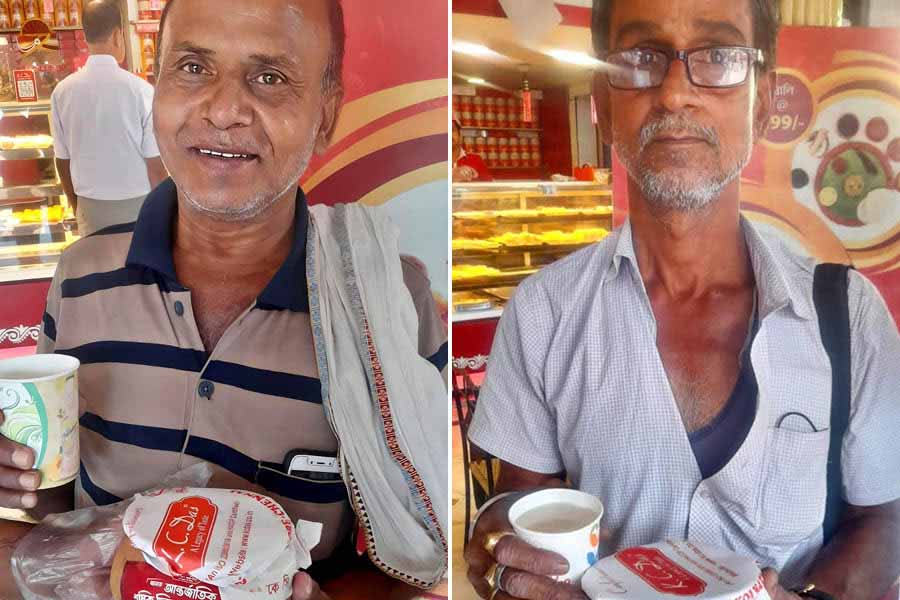Oh to be 102! And look the epitome of casual elegance, recall with a clear vision and share stories that are not of a rambling kind, but rather recollections that are tantalisingly historic, laced with humour and leavened with a quiet conviction. That is Aditi Mukerjea for you, receiving me with grace in a cotton kaftan, her silver tresses prettily framing a centenarian with twinkling eyes and brimming with tales to share.
Minumashi has been part of our lives for a very long time, as my mother’s friend, and friend’s mother, but our story goes much above and beyond the personal. As we view someone who has been witness to a nation in change, one who has imbibed the heritage of Deshbandhu Chittaranjan Das, her grandfather, has ingested the tradition and values of the Swarajya movement, and inspired by grandmother Basanti Devi and subsequently her mother Sujata Devi, grown an orphanage into a school and college that flourished under her tutelage.
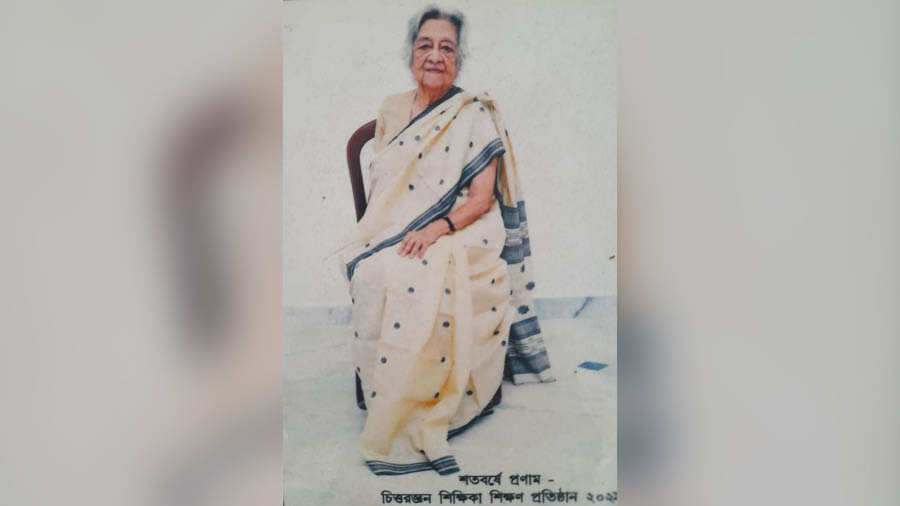
Sujata Devi Vidyamandir emerged from the orphanage started by Sujata Devi and is now a co-educational English-medium primary school
A fascinating part of history
In recounting the growth and development of the Sujata Devi Vidyamandir, Mukerjea shares with us a fascinating part of history when Mahatma Gandhi came into the picture. It was the grim times of the infamous Noakhali riots. Sujata Devi had started an orphanage and at the time had sadly lost one of her own children and Gandhiji said, no worries, I will send you not five, but six Hindu girls for rehabilitation. And that was the beginning of the Bangiya Pallee Sangathan Samity. The orphanage was to morph into a more meaningful school, as she felt that without education, the women could not grow and become self-reliant. People sent their daughters to this school, and once government sponsorship kicked in, with property in its wake, the school, which got recognition in 1953 from the state board, went on to become a college. The English-medium primary school is now co-educational.
Involvement from the highest quarters
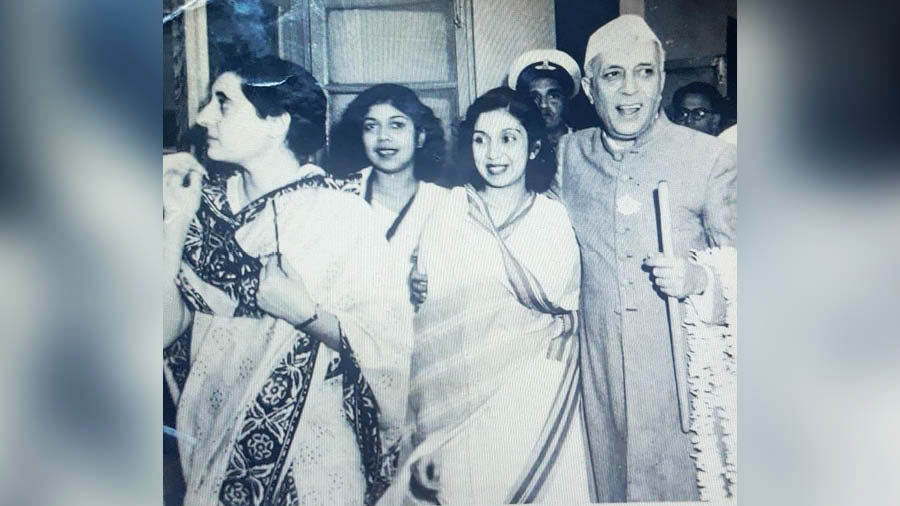
Aditi Mukerjea with the Nehrus
Involvement in these developments came from the highest quarters and no person was too important to be involved. There was Dr Amarnath Mukherjee, Renuka Ray, M.P., a social activist and a champion of women’s rights, Gita Mukherjee, wife of Justice Mukherjee, and royals like Maharani Indira Devi of Cooch Behar.
Dr B.C. Roy, one of the tallest chief ministers of the state, an outstanding physician, was inspired by Deshbandhu and joined Bengal politics and subsequently the Swarajya Party. When Dr Roy was imprisoned post the AICC session in 1930, which had been declared illegal, he actually came to the help of prisoners in Alipore jail, taking charge of the hospital there. He was a personal physician of Basanti Devi.
And what of the Maharani Radha Devi of Burdwan, who was another concerned individual? She was minister of state in Dr B.C. Roy’s time and the story goes, a tangential one, if we must, of how she found the prisoners to be passionate about gambling. Instead of remonstrance, she sent them decks of cards.
Enter Raj Kapoor...
Mukerjea packs a pretty punch when she narrates all this. And, what’s more, saves the juiciest bits that form a part of the growth of Sujata Devi Sadan. Enter Raj Kapoor — who came at the behest of the swashbuckling film producer Hemen Ganguly, a family friend — and giving India a taste of a blockbuster of its time — Bobby. The year is 1973. An auditorium is the need of the day at Sujata Devi Sadan. Bobby premieres at Metro cinema. The take? A whopping Rs 2 lakh! And all of it is given to the school. Till this day, the auditorium in the heart of the city on Hazra Road continues to serve the community and is lent out at subsidised rates, so that there can be music schools which can benefit, as can charitable organisations that need a platform.
I was fortunate to visit Sujata Devi Sadan on its 75th year at the invitation of Mukerjea’s daughter Brinda Srinivasan, wife of former foreign secretary, Government of India, who is carrying on the legacy of her forebears. The whole event was perfectly timed, with music, speeches and performances. When the English-medium school was created as a pilot project, the response was an unstoppable 100 girls coming to enrol.
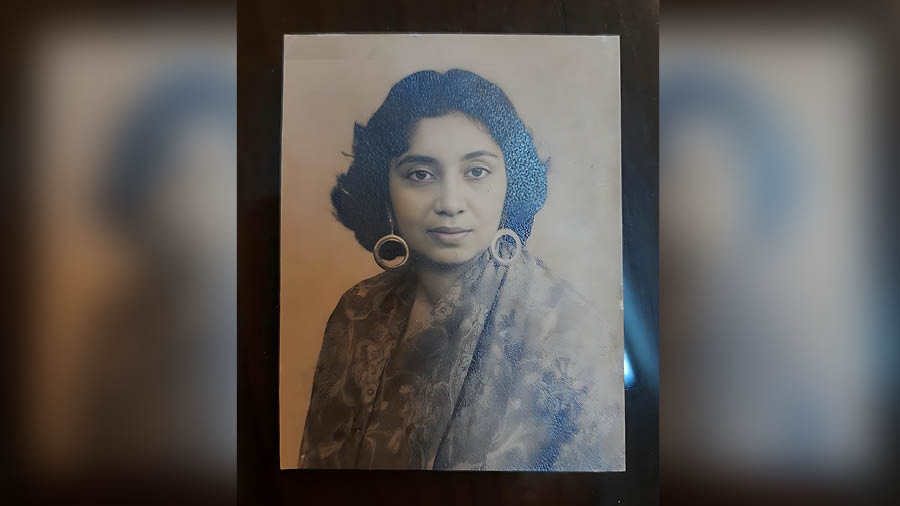
Aditi Mukherjea
Riveting tales of Basanti Devi
Riveting, too, are the tales of Mukerjea’s grandmother, Basanti Devi, the grand dame wife of Deshbandhu Chittaranjan Das, who was conferred the Padma Vibhushan — the second-highest civilian honour in her time.
Says Mukerjea: “Thakuma lived up to a ripe old age of 95. I feel it was she who encouraged C.R. Das to continue his legal practice, when at that time he was earning Rs 50,000 a month. He gave it up with her permission and father’s permission and went on to join the Swarajya movement. Thakuma joined the non-cooperation movement and along with Urmila Devi, my grandfather’s sister, who was a lifelong widow and a lifelong fighter for swarajya, she was jailed. The Congress Party did not want them to be released, but it was the English governor who came and got them out.”
“Thakuma’s bravery extended to the coolie strike in Chittagong in 1921. It is said to have been a real victory for the Bengal non-cooperation movement. At the end, Gandhiji's intervention was called off. But resolute Thakuma made it by boat, along with her husband when a storm arose, and they had to abandon the nouka. They then trudged through kaash fields and finally came upon a light in the distance which belonged to a snake charmer. He directed them to a home where they were fed khichuri.” Unexpected hospitality, unprecedented bravura.
Tackling the high life in their stride
Many more anecdotes, but one that is abiding is how Basanti Devi did not believe in having statues of her husband, over which crows would make merry, or in changing names of roads from scything the British ones to giving them lengthy names of prominent and not-so-well-known Indians. What is germane to this story is the address where Mukerjea and her family live. Nafar Kundu Road. Basanti Devi insisted on keeping the name. Nafar Kundu was a Muslim sewage worker, who heroically risked his own life when he went into a manhole to save two other Hindu sewage workers trapped inside. A memorial built in his honour was made possible by funds raised from the public.
But what of her personal life which Aditi Mukerjea and Adhip Mukerjea enjoyed to the fullest? The 300 Club, for one, was the go-to place for those who could belong. Fine dining, dancing, and thence to the Golden Slipper to end the evening. Mukerjea recalls her mischievous acts of changing place cards at a sit-down dinner so she could sit next to a preferred partner!
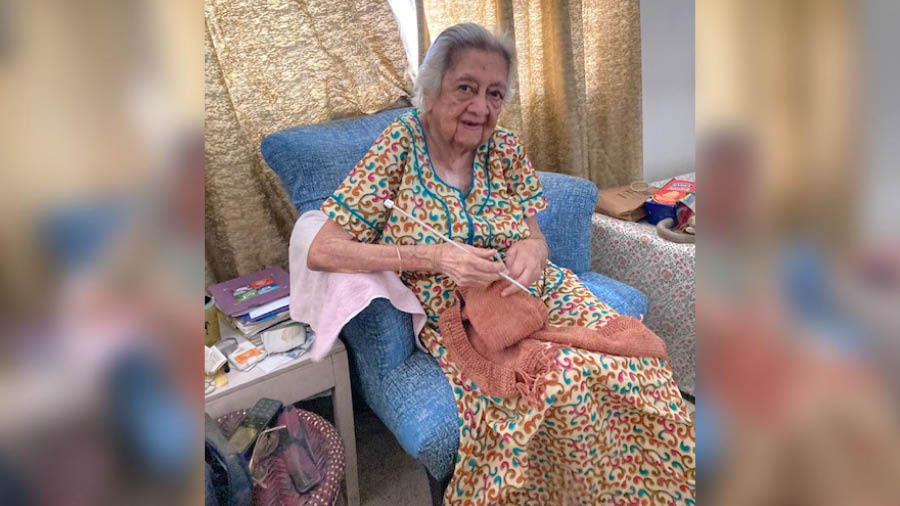
Knitting is an abiding hobby that continues apace as she keeps herself occupied making fashionable scarves for her grandchildren and sweaters for the great grandkids
A conscientious voter since 1952
They raised four children — two boys and two girls — and the family grew into seven grandchildren and another seven great grandchildren. They travelled the world, but home was where the hearth was. Cooking became a passion and who can forget the signature dish of a chingri maacher cutlet curry?
Knitting is an abiding hobby that continues apace as she keeps herself occupied making fashionable scarves for her grandchildren and sweaters for the great grandkids.
Another key aspect of Mukerjea’s persona — her deep political commitments. She has always upheld the duty of every citizen to vote and has proved it as she has uninterruptedly been a conscientious voter since 1952, the very year when Syama Prasad Mookerjee was elected as an MP from Kolkata South East. All of seventy years! Sadly the pandemic put a brake on the proceedings – not of her making naturally – and the whole idea of a postal ballot was not going to be possible as the Election Commission nixed the idea. In any case, the postal ballot was always a no-no for her.
So much credit given to everyone but herself. Maybe that’s what keeps her glowing with such amazing grace. And luminous is the aura that she gives out. A fulfilling journey where age is just a statistic. And not static at that. As she continues in alert mode, mellow, empathetic, in sync with friends and family, content to have imbibed the dappled highs and lows of a whole century.
Rita Bhimani is a PR expert, author and columnist.


